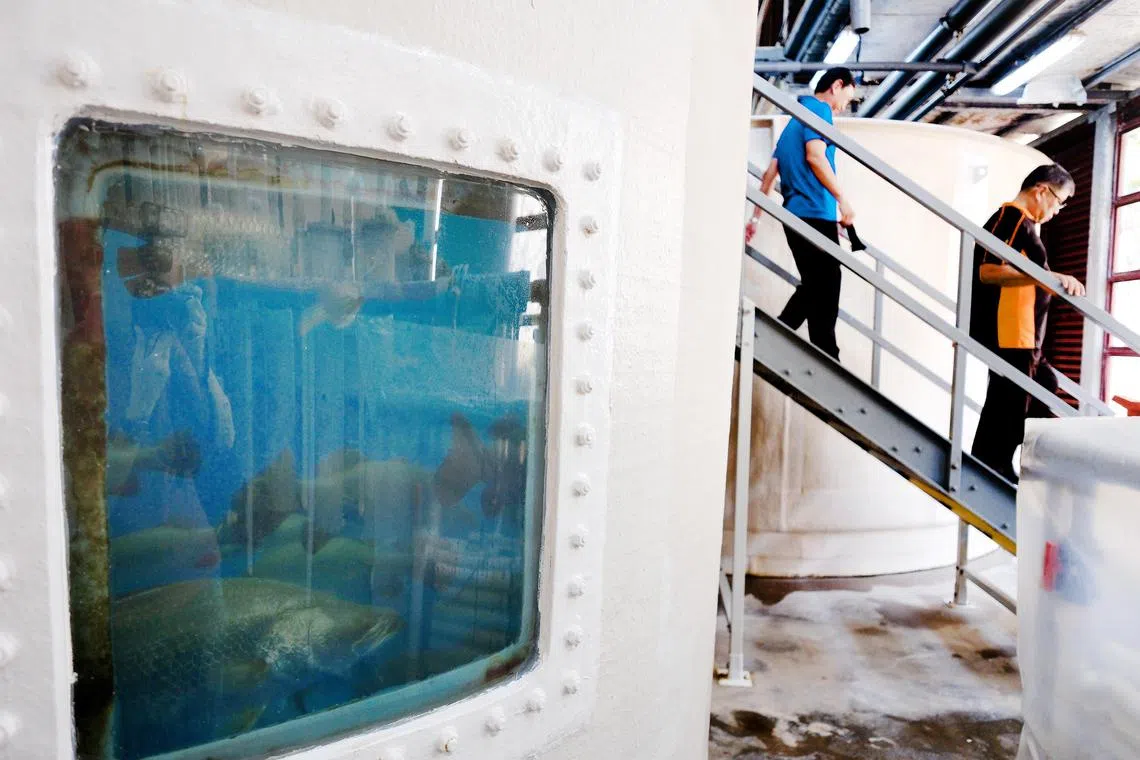Singapore fish farms get boost with new research programme
Sign up now: Get ST's newsletters delivered to your inbox

Asian sea bass broodstock at the Singapore Food Agency's Marine Aquaculture Centre.
PHOTO: LIANHE ZAOBAO
SINGAPORE – Developing vaccines for the Asian sea bass and studying how gut microbes affect fish health are among the advancements in aquaculture scientists hope to achieve under a new research programme to give local fish farms a boost.
The AquaPolis Programme will focus on three fish species – barramundi (Asian sea bass), red snapper and marine tilapia – and will cover fish breeding and genetics, nutrition, the environment and talent development in aquaculture.
Research will officially kick off with the signing of an agreement on Wednesday by the Singapore Food Agency (SFA), National University of Singapore (NUS), Temasek Life Sciences Laboratory and several local farms at the Global Agri-Food Scientific Symposium.
Aquaculture is the farming of seafood at sea or on land. Most of Singapore’s fish farms are offshore,
Local farms produced 4,400 tonnes of seafood in 2022, which accounted for almost 8 per cent of all seafood consumed here.
Land-scarce Singapore aims to up this amount, as fish is a protein source that can be produced efficiently here, said SFA.
To achieve this, tackling common diseases and parasites, improving the survival of newly hatched fish and minimising environmental impact are crucial.
AquaPolis falls under the larger Singapore Aquaculture Plan, which aims to improve the aquaculture sector here.
Singapore Aquaculture Technologies, which farms mostly sea bass off the eastern coast of Singapore, is hoping that an mRNA vaccine against the scale drop disease virus can be developed through the programme.
Scale drop disease, endemic to the waters of South-east Asia, can kill up to 70 per cent of a pen of Asian sea bass during an outbreak. The virus causes scale loss and fin erosion, among other symptoms.
Barramundi Group, Singapore’s only aquaculture firm currently operating in the southern waters, recently stopped commercial production at its three farms due to scale drop disease outbreaks.
While Singapore Aquaculture Technologies’ fishes are not reared at sea, its chief technical officer Michael Voigtmann is not taking any chances with the deadly virus.
The company runs a few barges off Changi, housing indoor tanks of fish.
“Even though we are a closed containment system, we are not biosecure. We have open walls, the barges are floating on the water and we have incoming fish from other hatcheries that might harbour the disease,” he said.
Associate Professor Christoph Winkler from the NUS Department of Biological Sciences, one of the scientists under the AquaPolis Programme, is also investigating why a bulk of red snapper fish larvae struggle to survive beyond their larval stages in indoor hatcheries and suffer skeletal deformities.
Discoveries about the human gut microbiome, for instance, have shown how bacteria, fungi and other micro-organisms in the intestines strongly influence various aspects of health, including immunity and even mental well-being.
Prof Winkler wants to unlock similar discoveries for fish health as well.
“We know very little about the microbiome in the waters and in the guts of fish, but its components define whether the fish is healthy and disease-resistant,” he said.
Associate Professor Liou Yih-Cherng, director of NUS’ special programme in science, said that to increase the pool of high-tech farming talent here, the creation of a minor programme in agriculture and aquaculture under the university’s life sciences arm is being explored.
Speaking at the symposium at the Sands Expo and Convention Centre on Wednesday, Senior Minister of State for Sustainability and the Environment Koh Poh Koon said two sub-committees will co-develop the Singapore Aquaculture Plan with stakeholders, to raise the productivity of aquaculture here, while ensuring that farms do not end up harming the marine environment.



